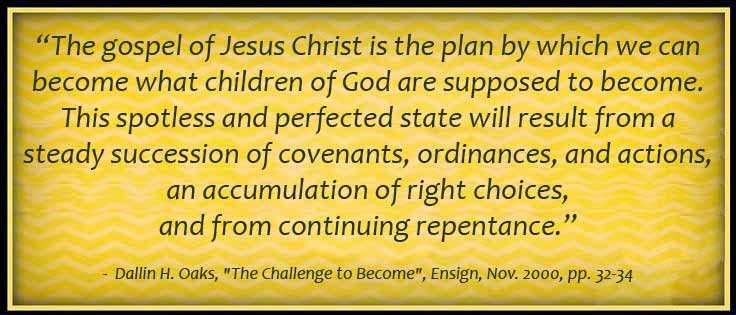"If we are only willing to open our hearts and minds to the spirit of Christmas, we will recognize wonderful things happening around us that will direct or redirect our attention to the sublime. It is usually something small—we read a verse of scripture; we hear a sacred carol and really listen, perhaps for the first time, to its words; or we witness a sincere expression of love. In one way or another, the Spirit touches our hearts, and we see that Christmas, in its essence, is much more sturdy and enduring than the many minor things of life we too often use to adorn it.
"In these precious moments we realize what we feel and know in our heart—that Christmas is really about the Christ.
"Christmas and some of the cherished traditions of the season remind us that we, like the Wise Men of old, should seek the Christ and lay before Him the most precious of gifts: a broken heart and a contrite spirit. We should offer Him our love. We should give Him our willingness to take upon ourselves His name and walk in the path of discipleship. We should promise to remember Him always, to emulate His example, and to go about doing good. (See Acts 10:38; Doctrine and Covenants 20:77, 79.)
"We cannot offer Him the gift of perfection in all things because this is a gift beyond our capacity to give—at least for now. The Lord does not expect that we commit to move mountains. But He does require that we bring as gifts our best efforts to move ourselves, one foot in front of the other, walking in the ways He has prepared and taught."
- Dieter F. Uchtdorf, "Of Curtains, Contentment, and Christmas," First Presidency Christmas Devotional, December 4, 2011
Click here to read or listen to the full talk
How do we find the "true spirit of Christmas"? President Uchtdorf suggests there are many things in the season that will direct our thoughts and hearts in that direction if we allow them to, including music, scriptures, and expressions of love. We must get past the external symbols and learn to focus on the Christ as the essence of Christmas.
And then we are prepared to offer up our gifts to Him, precious gifts of love and service, of true discipleship as we remember Him and follow His example in doing good:
We can't yet offer the ultimate gift of perfect discipleship. But He doesn't expect that yet. He only asks "that we bring as gifts our best efforts to move ourselves, one foot in front of the other, walking in the ways He has prepared and taught." What a beautiful, encouraging thought.
(Compilation and commentary by David Kenison, Orem, Utah, 2021)
December 7, 2017
December 7, 2017

































